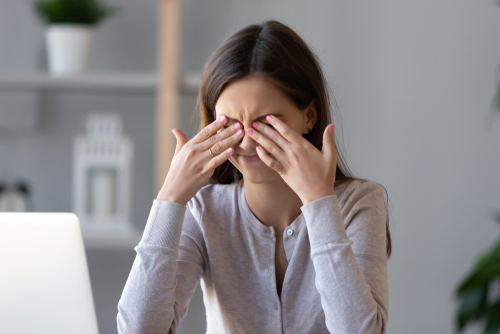

Are your eyes constantly red and itchy? Do you find yourself needing to blink frequently to clear your blurry vision?
You may be suffering from dry eye syndrome, a very common eye condition that millions of Americans experience every year. You may ask, why is this problem so prevalent, and what can I do to stop it?
Keep reading to learn more about what could be causing your dry eye!
Three different layers make up the tear film, which lubricates the cornea. The cornea is the clear dome that is at the front of your eye.
The first layer, which sits closest to the cornea, is known as the mucin layer. The mucin layer is made of mucus, and its job is to maintain the hydration of the cornea.
The middle layer is the aqueous layer, which is mainly made of water and makes up the largest part of the tear film. The aqueous layer provides oxygen to the cornea and is responsible for flushing away debris.
The lipid layer is the outermost layer of the tear film. The lipid layer, made primarily of oil, helps the tears stay on the eye longer and ensures they do not evaporate too quickly.
If any of the three tear film layers are not functioning properly, it can cause dry eye. Dry eye can be due to a problem in the gland that is producing that layer.
Although the aqueous layer is the largest layer in a tear, it is often not the cause of dry eye. More often, the problem arises in the lipid or mucin layer of your tears, affecting the quality of the tears.
If there is not enough mucus or oil to keep your cornea lubricated, the tears will evaporate quickly and cause dryness on the front surface. The oil in the lipid layer is made in small glands at the ends of your eyelids, which are prone to becoming blocked.
Sometimes, the culprit of dry eye is not the tear quality. Dry eye can also be caused by the amount of tears being produced or a problem in the tear drainage mechanism of your eye.
Certain lifestyle choices can affect your eyes. A poor diet can deprive your eyes of the nutrients they need in order to function well.
Exposing your eyes to sunlight for long periods of time without protection can damage them. On the other hand, your environment may also play a key role in your dry eye problem.
Dry air can sap the moisture right out of your eyes. Wind can carry sand and other particles that may irritate your eyes.
Sometimes areas with lots of pollen can trigger allergies in some people. Understanding your body and the effects of your choices on it can help you make a plan to stop dry eye.
You can take steps on your own to combat dry eye. Taking care of your body, using artificial tears, and avoiding environmental triggers will likely have a noticeable improvement on your dry eye.
If your dry eye is persistent and bothersome, it is essential to visit your eye doctor so they can properly diagnose you. Your eye doctor will determine the cause of your dry eye and recommend treatment.
Your eye doctor may ask you to use a humidifier in your home, wear sunglasses, and avoid going outside during high pollen counts. They may also instruct you to do other treatments to your eyes to improve your tear film.
Do you want to learn more about what could be causing your dry eye? Schedule an appointment at Advanced Eye Care in New Lenox, IL, today!